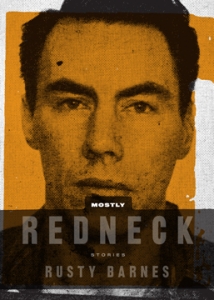Why isn’t “Rusty Barnes” a household name? Is it because he doesn’t schmooze the right people or because he isn’t semi-nude in his author’s photo? Or maybe it’s because he doesn’t write about the beautiful people.
The characters in Rusty Barnes’ outrageously good story collection Mostly Redneck (Sunnyoutside Press) wouldn’t be caught dead in a New Yorker story. They’re just a little too raw, a little too earthy, a little too human. I confess to fearing I might find the likes of Honey Boo Boo in these pages what with the Redneck title, but nothing could be further from the truth. Barnes’ characters are genuine, down-to-earth, blue collarfolk, some out of work, all suffering like everyone else in this hideous economy, probably more so. They’re wonderfully compelling and real, so much so it’s hard to stop reading. These characters have no pretenses, they don’t put on airs, they’re just trying to get by with what little they have, and each other. Barnes illustrates this wonderful community with amazing insight, candor, and beautiful prose.
How did he learn to write so well from a female point of view? In “What the Body Says,” two freshman roommates couldn’t be more opposite. Stella, the narrator, walks in on her roommate Kate having sex one night with “a skinny, dread-locked art student,” Kate who “never went home alone on a Friday night. . . . ‘Stella. Great timing,’ Kate says, then continues, ‘He might as well have been a pile driver. I’m going to bruise.’ She pulled her leggings partway down and arched her knee outward, revealing reddish-dark marks on her inner thigh, almost like smudges.”
Stella notes “the smooth muscle in her legs, how tanned she was, the way her black hair fell around her shoulders, and how she could screw a man on the greenhouse floor while I couldn’t get a firm coffee date.” And if you think that’s complicated, just read on to discover Kate’s mind-boggling reactions when Stella finally does hook up with “a long-haired Asian-looking man” who “radiated energy” and who looked “good, smooth and brown arms, long fingers, and already I imagined him rocking into me, feeling that aura of strength on my body. He wasn’t handsome, but beautiful, in that way that confident men are, a smooth amalgam: skin, bone, energy, quiet with his own power.”
And how does Rusty Barnes know enough about the world in “Rick’s Song” to be so insightful about it? Jimmy has quite a past, and he’d like to lose it, but it follows him everywhere. “Pride was a sin, Jimmy thought to himself, and there wasn’t much to be proud of working in a Chinese restaurant, run by Vietnamese, in a city that had no other Asians, either. . . . He’d turned the corner one day from the weekly trip to the unemployment office and walked past The Little Gold Dragon Delicatessen and its yellow laminated “Help Wanted” sign.
“‘You get two dollar hour and tip.’ Rick Andelman ran the place, and never washed his apron, which was now stained nearly black on the front.”
Rick isn’t his real name. “Li’s my name. Rick is for America. The new start,” Jimmy finds out soon enough as “Rick expelled smoke from his nose. ‘You’ll be maître d’ as of tomorrow.'”
Within days, Jimmy knows all about Binh and Song, who may not exactly be Rick’s son and daughter, and that there are people in the world with far more complex pasts than his own.
Maybe it’s the complexity of the characters and lives in Mostly Redneck that makes Rusty Barnes’ writing so enthralling and memorable. These lives are tense and full of what makes all of our lives tense.
A must-read if there ever was one. Buy it here.


Thanks very much, Bonnie.
You’re welcome, Rusty. Great book. I’ll post it again soon when the holidays are little more over.